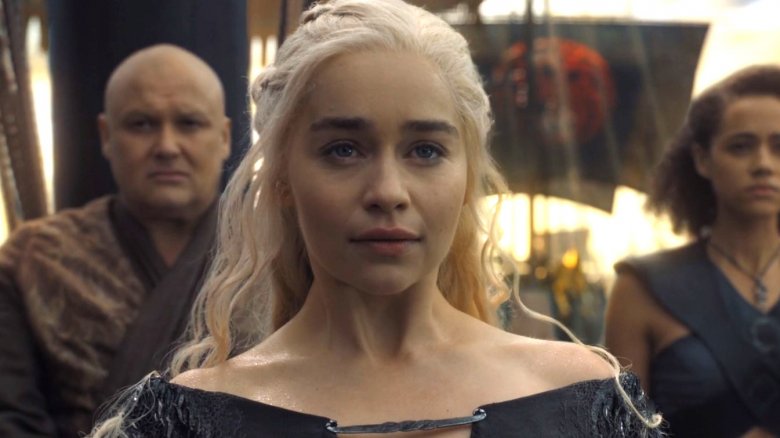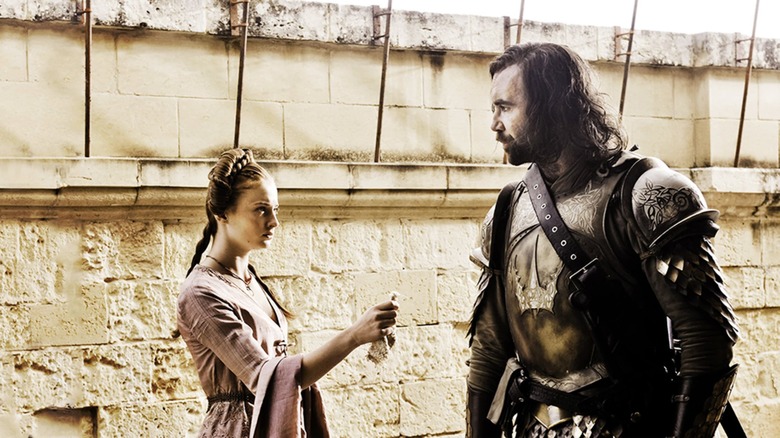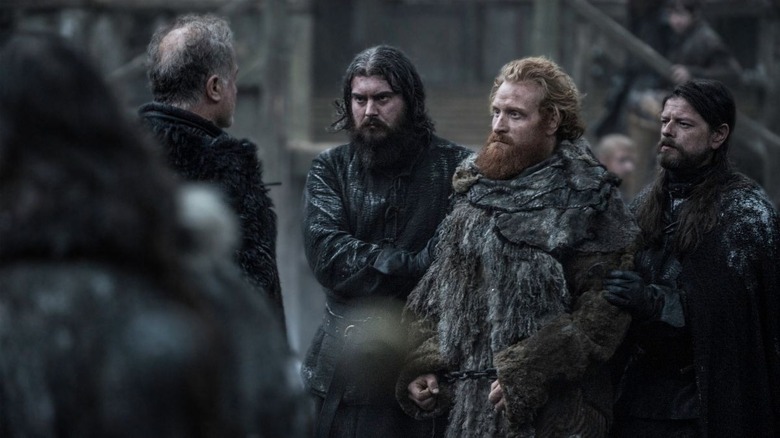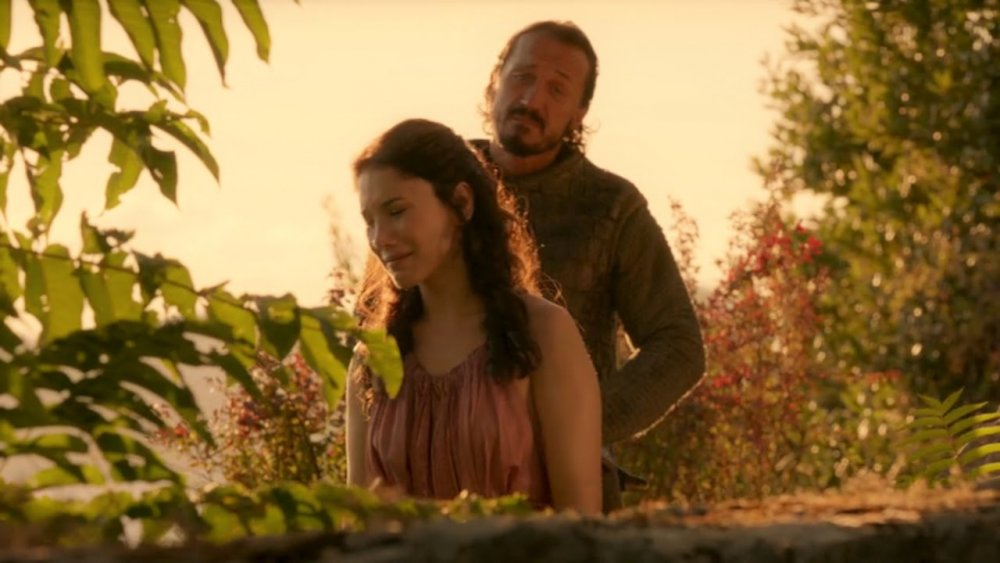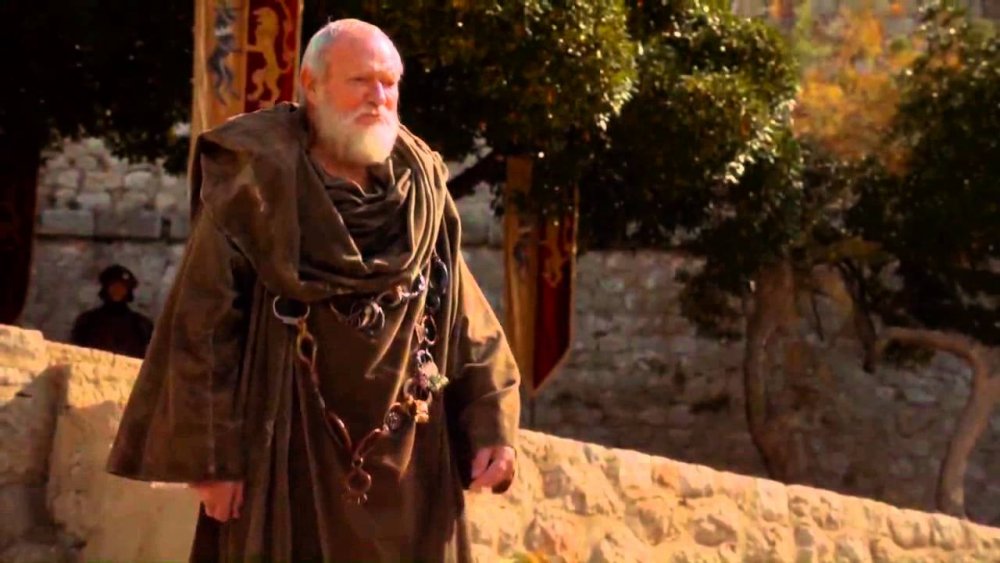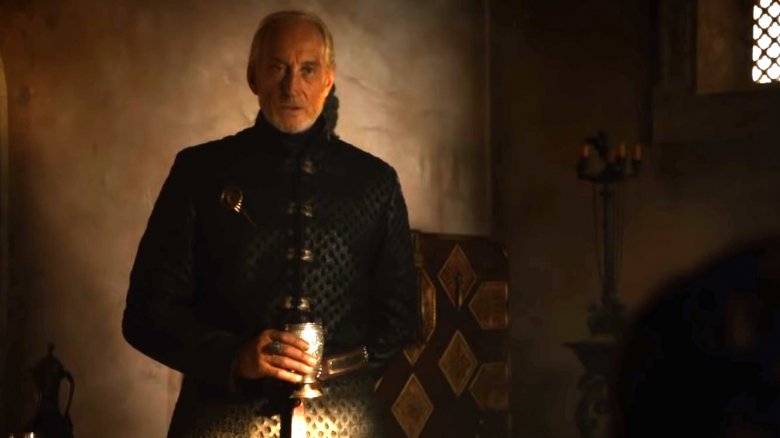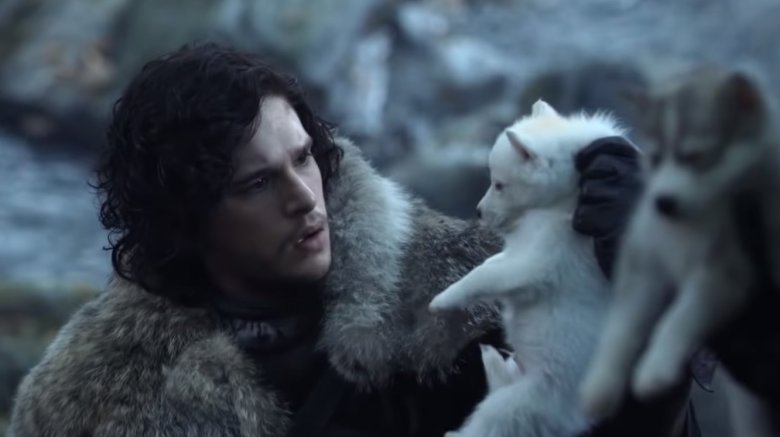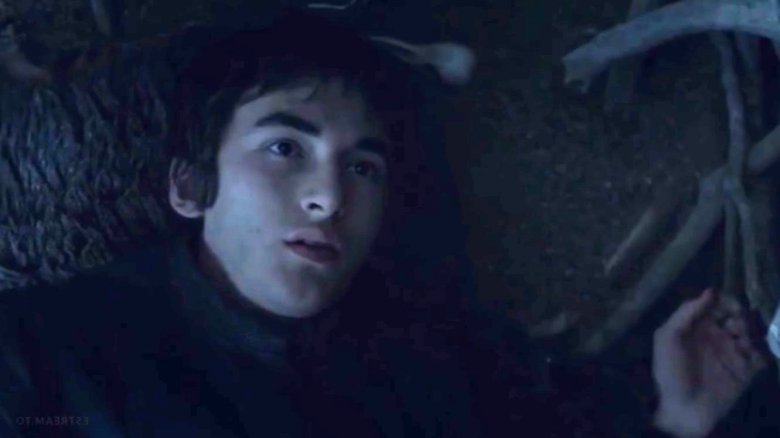Deleted Game Of Thrones Scenes That Would Have Changed Everything
At this point in Game of Thrones' long and winding road, it isn't just a TV show — it's an absolute saga. As the end of the series dawns, bringing with it magic, mayhem, and malice, speculation runs wild. How will the White Walkers be defeated? Will Jon Snow learn the truth of his parentage? Is Daenerys really a prophesied heroine, and will her dragons save the day? The character list is long and sprawling, crisscrossed with love, blood feuds, betrayals, and regret. Many seek to predict how the story might end, yet few will likely accomplish it.
As that ending crests the horizon, it's edifying indeed to revisit the deleted scenes deemed unworthy of being part of the canon — and especially those which would have changed the story entirely. Did you know, for example, that Tywin was even sharper and more cynical than you previously realized? Did you know that Sansa's career as the steely Lady of Winterfell began when she was still under Cersei's thumb? Though these scenes were ultimately cut, they're still fascinating to watch as audiences prepare for the end. We've collected the best of them for you to peruse and wonder: What would Westeros have looked like if they had been included? These deleted Game of Thrones scenes would have changed everything.
Season 2: Sansa stands up to The Hound
Sansa's journey has been one of Game of Thrones' most intense. From her start as a dreamy young girl looking forward to marriage and children to her days as the iron-hearted right hand of the King in the North, she has seen and done things the audience could never have predicted. One catalyst of this change has been the Hound, whose harsh heart has always seemed simultaneously drawn to and repulsed by Sansa's innocence. His insistence upon calling her a "little bird," fit only to sing songs for those in power, has always stood in contrast to his history of protecting her.
Yet one deleted scene shows a Sansa far more ready to stand up to his condescension than previously seen. In this season 2 clip, Sansa responds to his jibes defiantly, claiming she "doesn't know any songs" to sing to him. Not only would this have foreshadowed the stiffening of Sansa's spine, it would have changed how viewers saw her in the moment: Not as a quivering waif, but as a young woman beat and battered by those in power, yet learning she is capable of enduring it and, ultimately, triumphing. Perhaps the show's staff felt this too strong a sign of things to come and excised it. Yet it stands as a show of strength from a then-unlikely source.
Season 5: Tormund and Ser Alliser spar verbally
Tormund has always been a fulcrum upon which the tension between the Night's Watch and the Wildlings rest. He's committed to being part of the Free Folk, yet is also Jon Snow's friend. He is helpful to the Night's Watch, yet unsentimental about their history. As Jon Snow, then Commander of the Night's Watch, welcomed Tormund and other Wildlings across the Wall, this tension reached a boiling point, ultimately spilling over in the murder of Jon Snow and his subsequent resurrection by a band of committed friends.
But before that, there was a scene cut from season 5 in which Ser Alliser, one of Jon Snow's eventual killers, spars verbally with Tormund. He expresses how deeply he distrusts Tormund as a Wildling and how little he likes housing him — to which Tormund replies, "You must no longer be in charge, then." This is a moment of intense foreshadowing, but had it been included, it also would have made Tormund nearly somewhat culpable for Jon Snow's murder. He didn't wield a dagger, of course, but his needling might have been recalled in a moment of regret — and then uneasily, once Jon had been restored. It's an intense moment to be sure, and appropriate for that era of the show — but it would have cast a pall over an alliance that will now shape the future of Westeros.
Season 4: Bronn tells Shae to adapt
Game of Thrones mines conflict from every angle. Life against death, woman against man, religion against cynicism: All of it, and more, has formed the basis of the show. One of the most potent clashes is that of nobility against the common folk of Westeros. From ill-fated Ros to Osha the Wildling, many of the humble peasantry have bumped up against those from great houses — but Shae lasted longer than most. It took murder to wrench her and Tyrion apart, followed quickly by her damning testimony against him at trial and his subsequent murder of her in his father's bed.
It was tragic and extreme — two things very much in line with the show's tone. But a deleted scene between Shae and Bronn shows a tender and tragic aspect to this conflict that changes how one may view Shae's later actions. In it, Bronn commiserates with Shae as a fellow commoner, and urges her to adapt. It's the kindest we've ever seen Bronn, and it highlights how impossible Shae's position really was. As a result, what goes on to happen between her and Tyrion isn't just rendered terrible, but heartrendingly complicated. She did something awful, but this scene dares to ask — what choice did she really have?
Season 3: Tywin sees through Pycelle
Grandmaester Pycelle was always a duplicitous man. Even when he seemed to be every inch the doddering old fool, he would delight in passive-aggression towards the servant girls he bedded and dismissed and Tyrion, who he never missed a chance to disrespect. But for so many in power, and indeed, even many in the audience, his truly detestable nature went unnoticed.
A deleted scene between him and Tywin Lannister would have changed the dynamic immensely. Pycelle interrupts Tywin as he fishes, playing up his seeming foolishness to seem as unthreatening as possible. Unimpressed, Tywin cuts him off mid-babble: "Stop it. Am I the only one to see through this performance? Is it possible so many could be so stupid for so long?" Not only does this change the dynamic between them, it reveals how much less sharp everyone else in King's Landing is — and how fruitful that can be to the right manipulator. This scene doesn't just make Tywin more formidable, it diminishes everyone else and changes how the audience regards Pycelle: as a threat instead of a mild annoyance.
Season 2: Tywin considering investigating the White Walkers
From their introduction as blue-eyed shadows to their recent destruction of the wall, the White Walkers have always been the endgame enemy of Game of Thrones. Making most of Westeros face this, however, has never been easy. Jon Snow has spent an enormous chunk of his screen time arguing, convincing, and outright pleading with lords and ladies to take the Walkers seriously, and only recently has he gotten much of anywhere. They are the greatest threat the world has ever seen, but to so many, they are children's tales. Few have seen one, fewer still have fought them.
But in a deleted scene from season 2, it is revealed that Tywin Lannister took them seriously from the beginning. He discusses sending an envoy to Mance Rayder, then the King Beyond the Wall, after hearing tell of the corpses with blue eyes and their bone-white masters. This wouldn't just have changed how the audience saw Tywin — we know he was clever, but this would have been unparalleled foresight — but also raised the stakes for the Lannisters as a whole. Audiences would have wondered if they were going to see the first major house make inroads to the battle that really mattered, and thus set themselves up far better than those still thinking of the Walkers are horror stories. Tywin took the Walkers seriously when no one but the Watch did.
Season 2: Doreah kills Irri
Doreah was once one of Daenerys' handmaidens, who audiences are likely best able to remember as the woman helped her seduce Khal Drogo and, ultimately, was sealed into Xaro Xhoan Daxos' vault to die a miserable death by thirst and malnourishment. Her life was a brutal and confined one, sold, as she recalls, to a brothel at a young age and forced to conform to the whims of men for crumbs of power. Despite her maneuverings into Viserys and Xaro's beds, she doesn't ultimately get very far. Those who arouse the Khaleesi's ire rarely do.
In a deleted scene from season 2, we see what is likely the worst thing she ever did: strangling Irri, one of Daenerys' other handmaidens, in cold blood. She is not reluctant in the act — she is, in fact, cruel and mocking as she recounts the story of a man who once paid her to strangle him mid-coitus. This highlights not only how enormous her betrayal of Daenerys is, but also how ruthless the world of Game of Thrones makes people: If you have any chance at all to better your circumstances, you take it, even if it makes you cruel. Daenerys, still somewhat soft-hearted at this point in the story, had to learn this over the course of years, and this scene makes Doreah's cruelty one of the most important steps in her evolution to queendom.
Season 2: Loras and Margaery mourn Renly
Renly's death was the lynchpin of several story and character threads: Melisandre's dark and complex powers, the Tyrells' desire for power, and the War of the Five Kings at large. It's easy to forget, at the current point in the story, how formidable a threat he was, but he was a strong contender indeed: A man with the charm and charisma Stannis lacked, the backing of his large and fruitful house, and women as brilliant and careful as Margaery and Olenna at his side. This all, of course, came crashing down after his murder, but for a while, he had a chance.
Beyond all of that, though, he was Loras' lover, and a deleted scene from season 2 highlights that in tender style. In this scene, Loras laments his powerlessness to stop Renly's murder to his sister and what he sees as his culpability in it. Margaery embraces him as he sobs, and urges him to turn his attentions to their family. This scene makes the emotional stakes of the Tyrells all the clearer — it is easy to see Margaery as conniving and little else, but this makes it obvious that she is also a sister who loves her brother. What a dark echo her attempt to save him before their death at Cersei's hands would have seemed had this scene been included.
Season 7: Jon tells Ghost to take care of Sansa
The direwolves have always been more than just pets. Their fates have foreshadowed and influenced those of the Stark children from the beginning, from Lady's death and Sansa's subsequent suffering to Robb's murder and Grey Wind's mutilation. They are a sign of the family's communion with nature and the old ways of the First Men, and the Stark children's fixture in the center of Westeros' affairs. That Ghost survives is a miracle, and a testament to Jon Snow's centrality.
In a deleted scene from season 7, Jon gave Ghost a job: keep Sansa safe while he was off meeting Daenerys. As Ghost is, essentially, the only Stark direwolf left, this is a sign of just how much Jon cares for Sansa, and thus how vitally important the Stark kids' allegiance to each other has become as the end of the series dawns. Theirs is a bond that will determine the end of the series, an alliance that has survived that of the Lannisters, the Tyrells, the Targaryens, and anyone other family of comparable power. Ghost is part of Jon, and thus, part of Jon remains at Winterfell. Given recent revelations about his parentage, this could prove complicated — and game-changing.
Season 6: Olenna plots to save Loras and Margaery
Olenna Tyrell has always been one of the most fearsome characters on Game of Thrones. A brilliant strategist, a cynical plotter, and a devoted grandmother, there was very little she would not do to protect her family and their interests. Most notoriously, of course, was her murder of Joffrey Baratheon at his wedding to her granddaughter Margaery — and the total inability of the Lannisters to discover her culpability.
Seeing her, in a deleted scene from season 6, discussing the Lannisters with her son, Mace Tyrell, is all the more fascinating in light of these plans. Mace, made Cersei's Master of Coin, is totally ignorant to how he is being used, but Olenna is not, and she is determined to keep Loras and Margaery, prey to Cersei's depredations, as safe as possible. This scene brings to light exactly how narrowly Cersei's plan came to failure, and how enormously the Tyrells would go on to lose in season 7 — and, thus, how powerful Cersei truly is. The cast is enormous and forces were arrayed on both the Tyrell and Lannister sides, but really, it all came down to a game of wits between the Queen of Westeros and the Queen of Thorns. With the latter deposed and her family in ruins, Cersei's evil is uncovered — and the stakes are laid bare.
Season 7: Bran and Sansa discuss Littlefinger
Sansa, Bran, and Arya's condemnation and subsequent execution of Littlefinger was one of the most shocking moments of season 7's finale. Despite the man's machinations, despite his connections, and despite how far he'd clawed himself up from his humble origins, his death was swift, brutal, and totally out of his control. The Stark children knew of his deceptions and were no longer willing to bear his presence or indulge his pretensions. Yet how did they know of these crimes? From Littlefinger's conspiring with Cersei to his planning of the murder of Jon Arryn, Sansa listed off dark deeds long concealed by deaths and lies.
It turns out Bran confirmed it all.
Bran Stark actor Isaac Hempstead Wright revealed in a past interview with Variety that he and his Game of Thrones co-star Sophie Turner, who plays Sansa, shot a sequence in which Sansa consults him ahead of Littlefinger's trial. You see, Sansa was first convinced that her own sister, Arya, was out to murder her in attempts to become the Lady of Winterfell. Arya felt certain of the same — and it was all thanks to the master manipulator Littlefinger. Viewers were sweating buckets watching the season 7 finale, believing that one of the Stark girls would turn on the other and commit fratricide within the halls of their House's ancestral seat. Sansa and Arya flipping the script and sentencing Littlefinger to death was a massive twist — and seemed to leave a wide plot hole that went completely unpatched. The deleted scene Hempstead Wright discussed with Variety would have stitched up the gap and detailed exactly how the Stark sisters knew what Littlefinger was up to and how they arrived at their plan to execute the former Master of Coin.
In the scene, Sansa consults Bran about what to do regarding the whole "I think our sister is going to kill me" dilemma. Using his newfound abilities as the Three-Eyed Raven, Bran peers into Littlefinger's past and unearths every underhanded thing he's done to secure power.
As Hempstead Wright describes it, "We actually did a scene that clearly got cut, a short scene with Sansa where she knocks on Bran's door and says, 'I need your help,' or something along those lines. So basically, as far as I know, the story was that it suddenly occurred to Sansa that she had a huge CCTV department at her discretion and it might be a good idea to check with him first before she guts her own sister. So she goes to Bran, and Bran tells her everything she needs to know, and she's like, 'Oh, s***.'"
Though audiences can fill in the blanks without this scene, it makes Bran's powers all the more real, and, frankly, terrifying. Nothing can be kept from him, and as a result, nothing can be kept from his family. There is no secret Bran cannot uncover — and the biggest skeleton he drew out of the proverbial closet was the truth behind Jon Snow's birth. Bran knew of his brother-cousin Jon's true parentage and real identity as Aegon Targaryen, the son of Rhaegar Targaryen and Lyanna Stark, and his rightful claim to the Iron Throne over the wannabe queen Daenerys Targaryen before others did. His knowledge spread to Samwell Tarly, then to Jon himself, and (spoiler alert) quickly made its way to Sansa and Arya themselves.
Bran's access to the history of man and the secrets of Westeros is as astounding a skill as it is a powerful weapon. Season 8 of Game of Thrones demonstrated exactly that when Bran's awareness of Jon's status as the rightful heir to the Seven Kingdoms sparked a domino effect, playing a part in Daenerys' descent into madness and the destruction of King's Landing. Had the season 7 scene not been cut, it would have proven earlier in the series' run just how influential Bran's omniscience is and how his skills in Greensight and warging can alter the course of history and lead to the deaths of many. It may also have teased how Thrones will tie up its final episode, as rumored leaks claim that Bran, with his vast knowledge that will be useful as Westeros plunges into an era of restoration post-Daenerys' attack on King's Landing, could serve as the new protector of the Realm.
No matter who takes the Iron Throne, it's clear that all those who stand against Winterfell, the Stark kids, and their allies will tremble as the Game of Thrones series finale draws near. No lies can protect them now.
